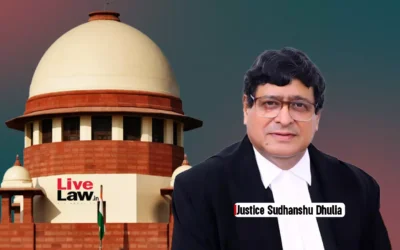INTERVIEW: Advocate Ravi Inder Singh, Advocate at Chandigarh District Court on the Biggest Challenges in litigation

Interview conducted by Krish sharma as a part of his Campus Leaders Program.
Advocate Ravi Inder Singh has been practicing at the Chandigarh District Court since 2010. He is the founder of Ravi Inder Legal Services, a law practice handling a wide variety of matters — from civil, criminal, matrimonial, and property disputes to consumer cases and cheque bounce matters.
He is known for his calm courtroom presence, methodical preparation, and a client-first approach. Over the years, he has mentored many young interns and believes in guiding students by exposing them to the ground realities of legal practice. His approach is not about shortcuts, but about discipline, observation, and steady learning — which makes him a perfect mentor figure for new law students entering the litigation space.
What inspired you to pursue a career in law?
I didn’t come from a family of lawyers, but I was always drawn to how law shapes society. I used to read about famous trials and was fascinated by courtrooms. Over time, that curiosity turned into passion, and I decided to pursue law as a full-time career. Once I started practicing, I knew this is what I was meant to do.
How did your journey begin after graduating?
The beginning was tough. I started in 2010 and had very few clients. I spent most days observing senior advocates, learning how they conducted themselves. No one gives you ready-made clients — you build your identity slowly. I made it a point to be consistent, arrive early, and absorb everything. That built trust over time.
What kind of matters do you mostly handle now?
My firm handles a variety of cases: Section 138 cheque bounce matters, civil disputes, family cases, and some property and consumer matters. I enjoy trial work the most because you can apply legal reasoning actively. But I treat every case with equal importance — a small recovery matter deserves as much focus as a complicated dispute.
How do you usually prepare for a hearing?
Every case deserves fresh reading before every appearance. Even if I’ve appeared in a matter multiple times, I go over the file again. Sometimes, small facts make a big difference. Judges can ask anything at any time — so preparation is your safety net. I also make short notes on arguments and recent judgments, just in case.
What are the biggest challenges you face in litigation?
Client expectations are the hardest to manage. Many clients believe that once they hire a lawyer, results should be immediate — but litigation doesn’t work that way. Some matters go on for years. You have to be honest with clients and guide them with clarity, not false promises. Another challenge is switching between different matters in a single day — you have to reset your mind for each.
How do you deal with stress or pressure?
There’s always pressure, especially when you have multiple matters across different courts. But I believe if you prepare properly and keep your ethics clean, you don’t have to worry too much. I also try to balance it out with casual moments. In fact, during breaks, I often joke with my interns. One line we keep repeating is, ‘Kachairi aake chai nahi peeni to kya faida?’ — because tea is an essential part of our court life!
What’s changed in the legal profession since you started?
The biggest shift is digitization. Courts are moving online, case details are available electronically, and clients expect quick digital updates. It’s a good thing overall, but sometimes it leads to casual behavior. Clients now send important documents on WhatsApp like it’s a casual chat — that concerns me. We need to keep the seriousness of the profession intact.
What do you expect from interns or junior law students?
I don’t expect you to know everything. But I do expect punctuality, sincerity, and curiosity. Just showing up regularly, observing the court, and asking genuine questions — that’s enough. Most students want to do something fancy. But I tell them — watch how things are done first. Your time to argue and draft will come.
What advice do you have for students unsure about career paths — judiciary, litigation, or corporate?
Try everything once. Do an internship in courts, one in a firm, and maybe work on a legal aid matter. Don’t decide too early. You’ll only know what suits you when you experience it. Even if you don’t choose litigation, exposure to court will give you confidence and practical understanding.
Any final message to law students reading this?
Don’t rush. Don’t compare. Everyone grows at a different pace. Just be regular, stay honest, and never stop learning. The legal field looks huge from the outside, but once you start walking in it, you’ll find your space.
Key Quotes and Insights
- “You build your identity one case at a time.”
- “Litigation is not a quick fix. It’s a test of consistency.”
- “Observation is your best teacher in court.”
- “Don’t chase glamour — chase growth.”
- “Kachairi aike chai nahi peeni to kya faida?”
Disclaimer: Interviews published on Lawctopus are not edited thoroughly so as to retain the voice of the interviewee.
This interview is a part of our Star Interview series, conducted by the Campus Leaders at Lawctopus. Stay tuned for more!

